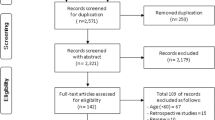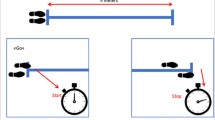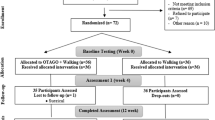Abstract
Background and aims: To compare changes in basic self-care activities in various cognitive groups of hip fracture patients by the Katz Index of Independence in activities of daily living (ADL). Methods: 117 community-dwelling elderly subjects with acute hip fracture (age 67–92 years), referred to the geriatric unit of Jyväskylä Central Hospital for rehabilitation, participated in the study. Basic self-care activities were evaluated by the Katz ADL Index and cognition by the Mini-Mental State Examination (MMSE). Results: Prior to hip fracture, the patients in the lowest MMSE group had a significantly lower Katz Index than the other three groups (p<0.001). Disability increased in a statistically significantly way post-surgery in all four MMSE groups (p<0.001). In the two lower MMSE groups, the Katz Index remained at the lower level, and in the two higher groups it improved in a statistically significant way from 2 weeks to 3 months post-operatively, after which it deteriorated slightly. A significantly larger proportion of patients in the higher MMSE groups were independent in all basic ADLs, both before and after fracture (from p=0.023 to p<0.001), except in continence prior to fracture. Conclusions: Prior to hip fracture, patients with low MMSE scores had a significantly greater degree of basic ADL dependence than the other three groups. Despite similar post-operative multidisciplinary treatment, functional ability remained at the lower level in the two lower MMSE groups, whereas recovery was much better in the higher MMSE groups.
Similar content being viewed by others
References
Sulkava R, Wikström J, Aromaa A, et al. Prevalence of severe dementia in Finland. Neurology 1985; 35: 1025–9.
Agüero-Torres H, Fratiglioni L, Guo Z, et al. Dementia is the major cause of functional dependence in the elderly: 3-year follow-up data from a population-based study. Am J Public Health 1998; 88: 1452–6.
Kyo T, Takaoka K, Ono K. Femoral neck fracture. Factors related to ambulation and prognosis. Clin Orthop 1993; 292: 215–22.
Lieberman D, Fried V, Castel H, et al. Factors related to successful rehabilitation after hip fracture: a case-control study. Disabil Rehabil 1996; 5: 224–30.
Steiner JF, Kramer AM, Eilertsen TB, Kowalsky JC. Development and validation of a clinical prediction rule for prolonged nursing home residence after hip fracture. J Am Geriatr Soc 1997; 45: 1510–4.
Heruti RJ, Lusky A, Barell V, Ohry A, Adunsky A. Cognitive status at admission: does it affect the rehabilitation outcome of elderly patients with hip fracture? Arch Phys Med Rehabil 1999; 80: 432–6.
Beloosesky Y, Grinblat J, Epelboym B, et al. Functional gain of hip fracture patients in different cognitive and functional groups. Clin Rehabil 2002; 16: 321–8.
Gruber-Baldini AL, Zimmerman S, Morrison RS, et al. Cognitive impairment in hip fracture patients: timing of detection and longitudinal follow-up. J Am Geriatr Soc 2003; 51: 1227–36.
Fried LP, Tangen CM, Walston J, et al. Cardiovascular Health Study Collaborative Research Group. Frailty in older adults: evidence for a phenotype. J Gerontol A Biol Sci Med Sci 2001; 56: M146–56.
Goldstein FC, Strasser DC, Woodard JL. Functional outcome of cognitively impaired hip fracture patients on a geriatric rehabilitation unit. J Am Geriatr Soc 1997; 45: 35–42.
Cree M, Carriere KC, Soskolne CL, Suarez-Almazor M. Mortality and institutionalization following hip fracture. J Am Geriatr Soc 2000; 48: 283–8.
Huusko TM, Karppi P, Avikainen V, Kautiainen H, Sulkava R. Intensive geriatric rehabilitation of hip fracture patients: a randomized, controlled trial. Acta Orthop Scand 2002; 73: 425–31.
Huusko TM, Karppi P, Avikainen V, Kautiainen H, Sulkava R. Randomised, clinically controlled trial of intensive geriatric rehabilitation in patients with hip fracture: subgroup analysis of patients with dementia. BMJ 2000; 321: 1107–11.
Katz S, Ford AB, Moskowitz RW, Jackson BA, Jaffe MW. Studies of illness in the aged. The index of ADL: a standardised measure of biological and psychosocial function. JAMA 1963; 185: 914–19.
Katz S, Downs TD, Cash HR, Grotz RC. Progress in the development of the index of ADL. Gerontologist 1970; 1: 20–30.
Folstein MF, Folstein SE, McHugh PR. Mini-mental state: a practical method for grading the cognitive stage of patients for the clinician. J Psychiatr Res 1975; 12: 189–98.
Grace J, Nadler JD, White DA, et al. Folstein vs modified Mini-Mental State Examination in geriatric stroke. Stability, validity, and screening utility. Arch Neurol 1995; 52: 477–84.
Forsell Y, Fratiglioni L, Grut M, Viitanen M, Winblad B. Clinical staging of dementia in a population survey: comparison of DSM-III-R and the Washington University Clinical Rating Scale. Acta Psychiatr Scand 1992; 86: 49–54.
Hux MJ, O’Brien BJ, Iskedjian M, Goeree R, Gagnon M, Gauthier S. Relation between severity of Alzheimer’s disease and costs of caring. CMAJ 1998; 159: 457–65.
Koval KJ, Skovron ML, Polatsch D, Aharonoff GB, Zuckerman JD. Dependency after hip fracture in geriatric patients: a study of predictive factors. J Orthop Trauma 1996; 10: 531–35.
Marottoli RA, Berkman LF, Cooney LM Jr. Decline in physical function following hip fracture. J Am Geriatr Soc 1992; 40: 861–6.
Binder E, Brown M, Sinacore D, Steger-May K, Yarasheski K, Schechtman K. Effects of extended outpatient rehabilitation after hip fracture. A randomized controlled trial. JAMA 2004; 292: 837–46.
Cree M, Carriere KC, Soskolne CL, Suarez-Almazor M. Functional dependence after hip fracture. Am J Phys Med Rehabil 2001; 80: 736–43.
Curry LC, Hogstel MO, Davis GC. Functional status in older women following hip fracture. J Adv Nurs 2003; 42: 347–54.
Morris JN, Morris SA. ADL assessment measures for use with frail elders. In Teresi JA, Lawton MP, Holmes D, Ory M, Eds. Measurement in Elderly Chronic Care Populations. New York: Springer, 1997: 130–56.
Lenze E, Munin M, Dew A, et al. Adverse effects of depression and cognitive impairment on rehabilitation participation and recovery from hip fracture. Int J Geriatr Psychiatry 2004; 19: 472–8.
Author information
Authors and Affiliations
Corresponding author
Rights and permissions
About this article
Cite this article
Häkkinen, A., Heinonen, M., Kautiainen, H. et al. Effect of cognitive impairment on basic activities of daily living in hip fracture patients: a 1-year follow-up. Aging Clin Exp Res 19, 139–144 (2007). https://doi.org/10.1007/BF03324680
Received:
Accepted:
Published:
Issue Date:
DOI: https://doi.org/10.1007/BF03324680




